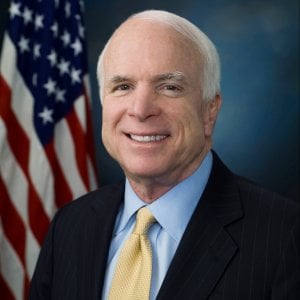John McCain’s Lasting Legacy for Animals
With the passing of Sen. John McCain, animals—and those of us who care about protecting them—have lost a friend and defender. As a U.S. senator for over three decades, he championed a wide variety of animal-friendly legislation.

McCain once proclaimed that “[g]overnment should take care of those in America who can’t care for themselves. That’s a role of government.” Judging by his voting record, he included animals in this sentiment.
In 2001, he co-sponsored a resolution that opposed commercial whaling and advocated for the protection of whale populations. In 2005, he co-sponsored the Horse Slaughter Prevention Act, which called for a prohibition on slaughtering equines for human consumption. He also supported one bill to stop the shipment of live birds between states for cockfighting and backed another to end the killing of bears for the purpose of selling or trading their organs.
And in 2010, the famously independent-minded senator turned his attention to animals used in experiments in a blistering report that he co-wrote. It blasted 100 “questionable,” “mismanaged,” and “poorly planned” stimulus-funded projects, including an especially cruel and wasteful experiment that the report aptly called “Monkeys Getting High for Science.” The study in question was being conducted at the Wake Forest University Baptist Medical Center, which nabbed $71,623 in stimulus funds (i.e., tax dollars) to feed cocaine to monkeys.
“I think all of [the projects] are waste,” McCain told ABC News at the time. “[S]ome are more egregious than others but all of them are terrible.”
Regardless of whether you agreed or disagreed with Senator McCain on political issues, there is no question that he was a man of integrity and of his word. His impressive career is a reminder that each of us can help prevent cruelty and practice kindness toward all living beings.
Note: PETA supports animal rights and opposes all forms of animal exploitation and educates the public on those issues. PETA does not directly or indirectly participate or intervene in any political campaign on behalf of or in opposition to any candidate for public office or any political party.

